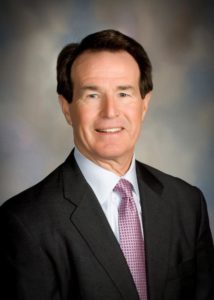Connecting Higher Education and Business – Fred Morgan
I’ve written numerous times about the importance of fostering mutually beneficial relationships between the business community and higher education. With ever-evolving workforce needs and years of cuts to our state’s higher education funding, such collaborations are more critical than ever.
I recently had the opportunity to tour Southwestern Oklahoma State University (SWOSU) and was impressed by the campus, the variety of courses and how the university is partnering with business and community leaders to ensure highly employable graduates.
SWOSU was recently ranked by MSN.com as 18th in the nation among 1,700 four-year colleges and universities for its affordability, flexibility, number of degree programs offered, graduation rates and other quantitative factors.
This impressive national ranking proves that excellence doesn’t necessarily depend on numbers — SWOSU has only about 5,000 students — but rather on smart and innovative approaches.
SWOSU’s success is also empowered by its community. Weatherford residents and private business owners have consistently supported the university during the development of new programs and the school’s expansion across town. Through a recent sales tax initiative, the community threw its support behind SWOSU and a state-of-the-art arena to house much of the university’s athletic facilities and several multi-purpose rooms used by the students, alumni and community. The facility partners with the private sector to host seminars, music concerts and other events which in turn generates revenue to defray costs.
Our tour included SWOSU’s Department of Engineering and Technology and the School of Nursing, where we saw how technology is being used to help prepare students for the jobs of the future. At the State Chamber of Oklahoma, we frequently hear from business leaders struggling to find employees with the 21st century skills they need. So it’s always encouraging to see examples of students being properly prepared for the workforce.
Southwestern Oklahoma State University has been proactive in readying its students for modern day careers. The university values business and real-world experience, and their students and local businesses will be better for it.
One key takeaway from the visit that I would like to see replicated across the state was the SWOSU Business Enterprise Center (BEC) Student Intern Program. With business community partners across the region, BEC has been offering students real employment experience since 2006. Through business planning, financial analysis and web design, students benefited from more than 9,000 hours of work experience in 2017 alone. A consistent complaint we hear from business relates to the lack of soft skills. This program provides real-world experience so essential to developing those skills.
Despite repeated budget cuts from the state capitol, SWOSU has managed to maintain affordable tuition over the last two decades. Still, the funding cuts take a toll on our higher education system and make it more difficult to attract and retain quality faculty.
For example, many parts of our state, particularly rural areas, face critical shortages of health care professionals. SWOSU has room for more students to pursue nursing careers and has a 100 percent employment placement rate. But the shortage of qualified instructors means that SWOSU cannot accept additional applicants to their program. From both a business and health care standpoint, this is a real problem that must be addressed.
In the face of funding challenges, SWOSU continues to dynamically adapt. SWOSU’s continued affordability, national rankings, community support and growing number of courses speak volumes about the university. We also appreciate the leadership of President Randy Beutler and his team in ensuring alignment between education and actual workforce needs.
When communities rally around their local universities and when local business leaders provide real-world expertise and opportunities, our entire state wins. SWOSU’s approach to modern, affordable and business-attuned education has proven a success — a success we hope to see modeled across the state.

